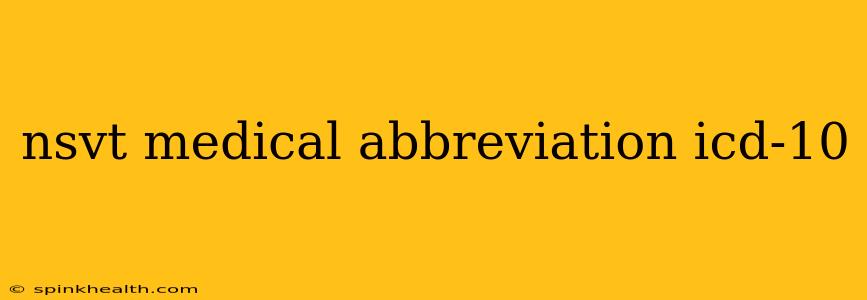The medical abbreviation NSVT stands for Non-Sustained Ventricular Tachycardia. It's a condition that can sound alarming, but understanding what it means is crucial to managing any anxieties and ensuring proper medical care. Let's unravel the mystery surrounding NSVT, its ICD-10 codes, and related concerns.
Imagine your heart's rhythm as a precise conductor leading an orchestra. Each beat is a carefully timed note, ensuring the smooth flow of blood throughout your body. Ventricular tachycardia (VT) is like the orchestra suddenly going wildly off-key. The ventricles, the heart's lower chambers, beat rapidly and irregularly. This erratic rhythm disrupts the heart's ability to efficiently pump blood, potentially leading to dizziness, fainting, or even more serious consequences.
Now, let's focus on "non-sustained." This qualifier is vital. Unlike sustained ventricular tachycardia, which persists for a longer duration, NSVT is characterized by brief episodes of rapid ventricular beating. These episodes usually last less than 30 seconds and often self-terminate. This means the heart rhythm spontaneously returns to normal without intervention.
What Causes Non-Sustained Ventricular Tachycardia (NSVT)?
NSVT can be triggered by various factors, some more significant than others. These include:
- Underlying Heart Conditions: Conditions like coronary artery disease (CAD), heart failure, and cardiomyopathy can increase the risk of NSVT. Think of it as a weakened orchestra struggling to maintain its rhythm.
- Electrolyte Imbalances: Electrolytes like potassium and magnesium play crucial roles in the heart's electrical activity. Imbalances in these electrolytes can disrupt the heart's rhythm, potentially leading to NSVT.
- Medications: Some medications can have NSVT as a side effect. It's crucial to inform your doctor about all medications you're taking.
- Stress and Anxiety: Emotional stress can sometimes trigger arrhythmias, including NSVT.
What are the Symptoms of NSVT?
Many individuals with NSVT experience no symptoms at all. The rapid heartbeat episodes are often too brief to be noticed. However, some may experience:
- Palpitations: A fluttering or racing heartbeat sensation.
- Dizziness: A feeling of lightheadedness or faintness.
- Syncope (Fainting): Loss of consciousness due to inadequate blood flow to the brain.
- Chest Pain: In some cases, individuals may experience chest discomfort.
What is the ICD-10 Code for NSVT?
The ICD-10 code for NSVT isn't a single, universally applicable code. The appropriate code depends on the underlying cause and context. Your physician will determine the most accurate ICD-10 code based on your specific case and medical history. This is why it's crucial to consult your doctor for an accurate diagnosis and appropriate coding.
How is NSVT Diagnosed?
Diagnosis often begins with a thorough physical examination and a review of your medical history. The following tests are commonly used to diagnose NSVT:
- Electrocardiogram (ECG or EKG): This test records the heart's electrical activity. While a routine ECG may not detect NSVT if it occurs infrequently, it can reveal underlying heart conditions that increase the risk.
- Holter Monitor: This portable device continuously records your heart's rhythm over a 24-48 hour period, increasing the chances of capturing an episode of NSVT.
- Event Recorder: A longer-term monitoring device that records heart rhythm only when triggered by the patient, allowing for detection of infrequent episodes.
What is the Treatment for NSVT?
The treatment for NSVT depends on various factors, including the frequency and severity of episodes, the presence of underlying heart conditions, and your overall health. Treatment might involve:
- Medication: Beta-blockers, antiarrhythmic medications, or other drugs might be prescribed to help regulate the heart rhythm.
- Lifestyle Changes: Stress management techniques, regular exercise, a balanced diet, and avoidance of excessive caffeine or alcohol can be beneficial.
- Implantable Cardioverter-Defibrillator (ICD): In rare cases, individuals at high risk for serious complications from NSVT may require an ICD, a device implanted in the chest that can detect and treat life-threatening arrhythmias.
Is NSVT Serious?
While NSVT itself isn't always serious, it can indicate an underlying heart condition that requires attention. Regular checkups with your cardiologist are crucial to monitor your condition and adjust treatment as needed. Many individuals with NSVT live long and healthy lives with appropriate management.
Remember, this information is for educational purposes only and shouldn't be considered medical advice. Always consult with a healthcare professional for any health concerns or before making any decisions related to your health or treatment.

